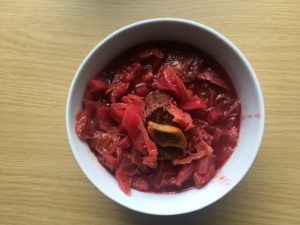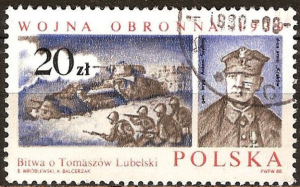Here’s a lunchtime bowl of my favorite food, borscht. 
My wife made it with latkes for Chanukah last night. My mother used to make it, too, of course. According to my mother, my wife makes a good bowl of borscht and she should know. She was born in Poland. She lived through the war because her mother, my grandmother, made a good bowl of borscht. I owe my life to borscht. Here’s why.
When World War II began in September 1939, the Germans pounded Poland. They took Poland with ease, but the overmatched Polish Army did fight and there were some major battles. One was in my mother’s hometown, Tomaszow-Lubelski. My grandfather was worried about Hitler before the war began, so worried that he rented a farm house for his family to live east of town. During the summer before the war, my mother, her kid brother and my grandmother lived on the farm while my grandfather lived in the city. His logic was that his family would be safer in the country should Hitler attack. On paper, this sounded like a wise idea, but in fact when the Germans attacked, they quickly took over the rural lands east of Tomaszow-Lubelski. The Polish Army fought to keep the town. The battle is famous enough to be featured on a Polish stamp.
My grandfather, separated from his family, was, no doubt, worried. During the battle, my grandmother heard a knock on the farm house door. A Polish translator was with a German lieutenant. Had that translator figured out that my grandmother and her family were Jewish, they’d likely have been shot. But context is everything. Jews didn’t live on farms. They lived in the city. Ergo the translator probably assumed my family was Polish. Looks are important, too. My grandmother looked like she was Roma. My mother, then nine years old, didn’t look Jewish either. With pale skin and Asiatic cheekbones, she didn’t look anything like her parents or brother (as a little kid, I assumed my mom had been adopted and that my grandparents were Polish and Yiddish speaking Native Americans; DNA says otherwise). Language is also important. My grandmother spoke a perfect Polish free of any Jewish accent. My mother didn’t even know Yiddish and spoke the Polish of an ethnic Pole. The translator probably thought, OK we’re at the home of a Pole who married a Roma. No one was going to get shot as a result.
The translator said, “The lieutenant is hungry. He wants a good bowl of soup. Make him some. Now.” My grandmother started to make some borscht immediately. The lieutenant stayed for two hours and waited. My grandmother talked with the translator and the lieutenant while the soup was cooking. My mother held her baby brother and prayed silently over and over that the translator and the German officer would not figure out that they were Jewish. Finally, my grandmother served the borscht to the German lieutenant and the translator. “Poles know how to make good soup. I’m going to like it here,” the lieutenant said. He left a happy man.
If my grandmother hadn’t made a good bowl of borscht, who knows what would have happened to her and her children? Nothing good, no doubt. I owe my life to a bowl of borscht.
Happy Chanukah


Recent Comments